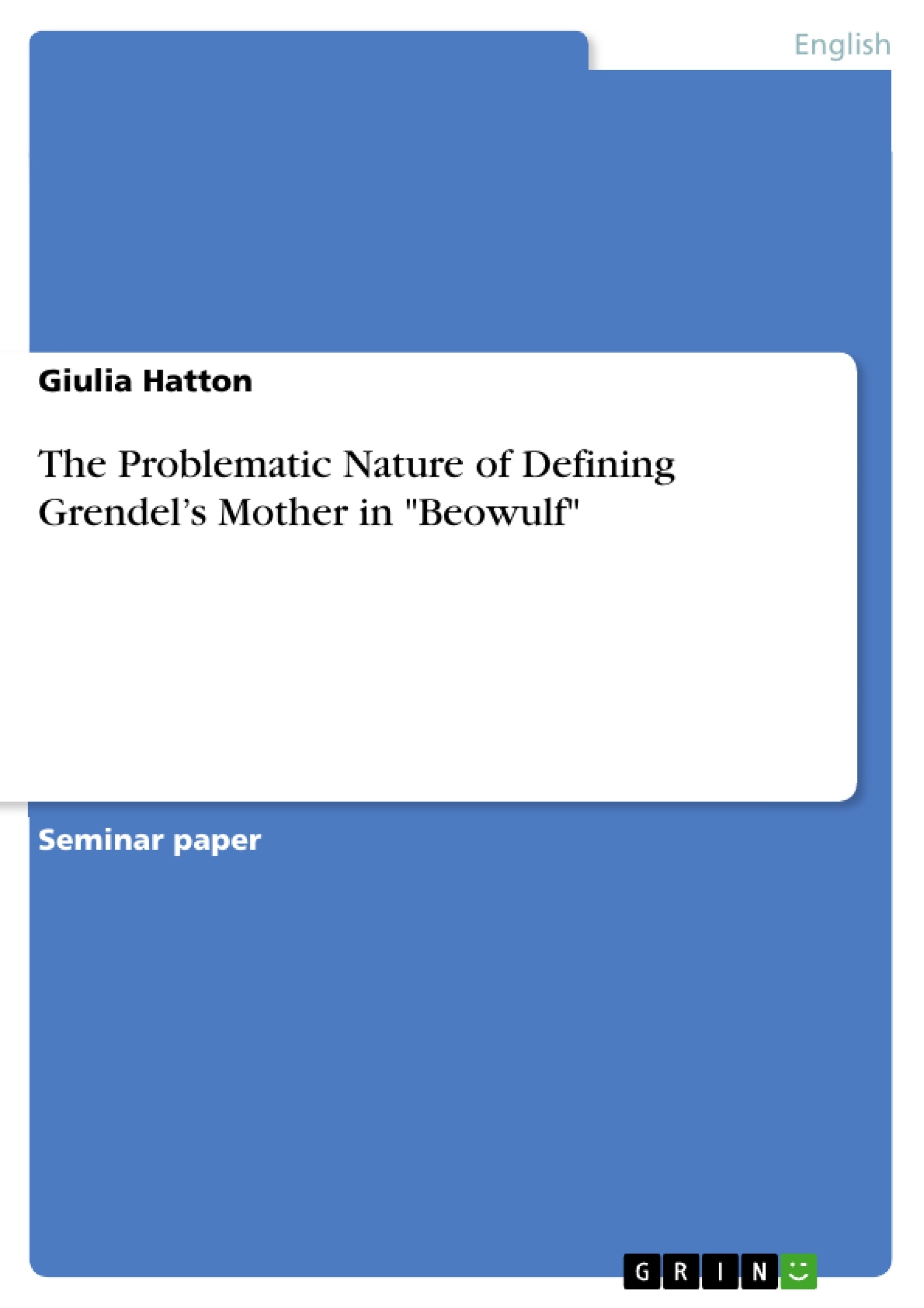The problematic nature of defining what exactly Grendel’s mother is in "Beowulf" has left little doubt that she has been even further removed from humanness than her son.
The problem seems to lie in the difference between modern conceptions of what distinguishes a ‘monster’ from a ‘human’ and the Anglo-Saxon understanding of these terms.
A possible explanation for this could be that there has been relatively little exploration of this female figure as an entity independent of her son, and what interest there has been has tended to classify her as a mere-monster, or quite literally, a mere monster. Even in Edward Irving’s rereading of "Beowulf", although he prudently observes that “the feminist movement has given us the power to open our eyes” to the phenomenon of the lack of critical attention given to Grendel’s mother, he still cannot bring himself to view Grendel’s mother as anything other than a monster.
In this essay I will attempt to turn the reader’s attention to this female character not as a monster, but as a warrior-woman, one who consciously violates the customs and rituals observed by peace-making women in Germanic society.
Table of Contents
- The Problem with Grendel's Mother Revisited
Objectives and Key Themes
This essay aims to re-evaluate the portrayal of Grendel's mother in Beowulf, challenging the common interpretation of her as a mere monster. It seeks to demonstrate that the poem's depiction of her as a "warrior-woman" reflects the values of Germanic heroic society and reveals the poet's ironic use of language.
- Re-examination of Grendel's mother's characterization in Beowulf.
- Analysis of the Old English word "āglæca" and its implications for understanding Grendel's mother.
- Exploration of the contrast between the narrator's and Hrothgar's perspectives on Grendel's mother.
- Examination of Grendel's mother's actions within the context of Germanic heroic values.
- Discussion of the poet's potential use of irony in characterizing both Grendel's mother and Beowulf.
Chapter Summaries
The Problem with Grendel's Mother Revisited: This essay challenges the conventional portrayal of Grendel's mother as a simple monster in Beowulf. It argues that the existing interpretations are rooted in modern conceptions of "monster" and "human," which differ significantly from Anglo-Saxon understanding. The author contends that Grendel's mother should instead be viewed as a warrior-woman, consciously defying the traditional societal roles of peace-making women in Germanic society. The essay explores this interpretation by analyzing the poet's language, the contrasting perspectives of the narrator and Hrothgar, and the implications of applying the term "āglæca" to both Grendel's mother and Beowulf. The author suggests the poet uses irony to highlight the potential for both monstrous and heroic behavior in both male and female characters, challenging simplistic categorizations of good and evil.
Keywords
Beowulf, Grendel's Mother, āglæca, warrior-woman, Germanic heroic society, Old English language, literary interpretation, irony, monster, Anglo-Saxon culture, feminist readings.
Frequently Asked Questions: A Re-evaluation of Grendel's Mother in Beowulf
What is the main focus of this essay?
The essay re-examines the portrayal of Grendel's mother in Beowulf, moving beyond the typical interpretation of her as a simple monster. It argues for a more nuanced understanding of her character, viewing her as a "warrior-woman" operating within the context of Germanic heroic society.
What are the key themes explored in the essay?
Key themes include a re-evaluation of Grendel's mother's characterization, analysis of the Old English word "āglæca," a comparison of the narrator's and Hrothgar's perspectives, examination of Grendel's mother's actions through the lens of Germanic heroic values, and a discussion of the poet's potential use of irony in portraying both Grendel's mother and Beowulf.
How does the essay challenge conventional interpretations of Grendel's Mother?
The essay argues that conventional interpretations are rooted in modern understandings of "monster" and "human," which differ from Anglo-Saxon perspectives. It proposes that Grendel's mother should be seen as a warrior-woman actively defying traditional societal roles for women in Germanic society.
What role does the Old English word "āglæca" play in the essay's argument?
The essay analyzes the implications of applying the term "āglæca" (roughly translated as "monster" or "terror-maker") to both Grendel's mother and Beowulf. This analysis helps to highlight the potential for both monstrous and heroic behavior in both male and female characters, challenging simple categorizations of good and evil.
How does the essay incorporate the perspectives of the narrator and Hrothgar?
The essay explores the contrasting perspectives of the narrator and Hrothgar on Grendel's mother to further develop its understanding of her character and actions within the poem's context.
What is the significance of Germanic heroic values in the essay's analysis?
The essay examines Grendel's mother's actions within the framework of Germanic heroic values to better understand her motivations and her defiance of societal norms.
What is the essay's position on the poet's use of irony?
The essay suggests that the poet employs irony to highlight the complexities of both Grendel's mother and Beowulf's characters, challenging simplistic notions of good and evil.
What are the key words associated with this essay?
Key words include Beowulf, Grendel's Mother, āglæca, warrior-woman, Germanic heroic society, Old English language, literary interpretation, irony, monster, Anglo-Saxon culture, and feminist readings.
What is included in this language preview?
This preview contains the title, table of contents, objectives and key themes, chapter summaries, and keywords.
- Quote paper
- Giulia Hatton (Author), 2012, The Problematic Nature of Defining Grendel’s Mother in "Beowulf", Munich, GRIN Verlag, https://www.grin.com/document/293160



